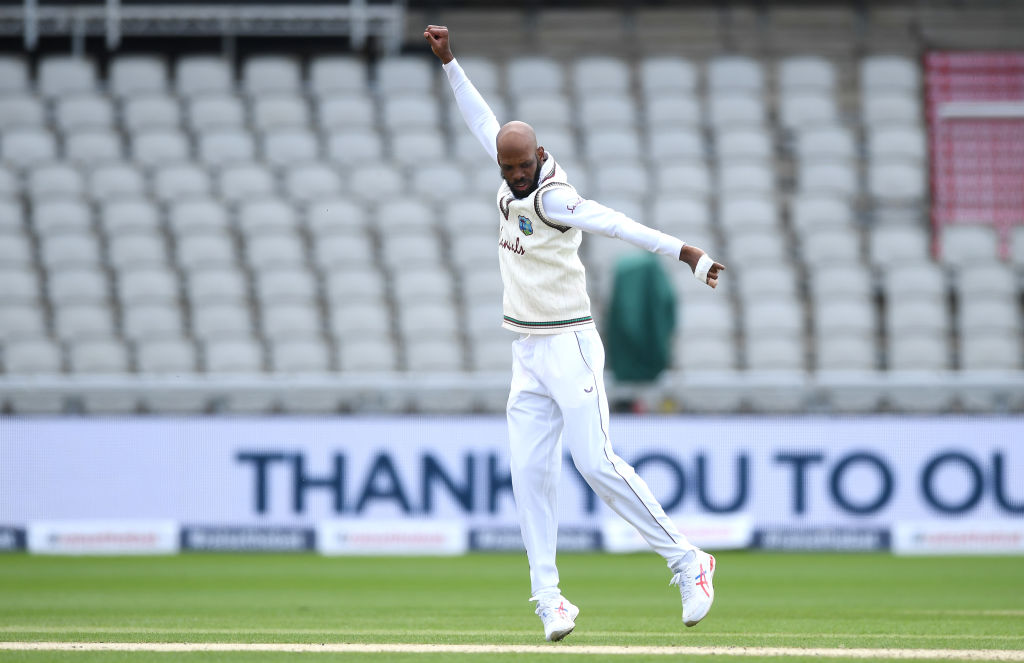Roston Chase’s spell a sign from the gods for Windies to make sacrifice for greater good
'The problem, simply put, is that we cannot choose everything simultaneously. So we live in danger of becoming paralyzed by indecision, terrified that every choice might be the wrong choice.' - Elizabeth Gilbert.

Ahead of the first Test at the Ageas Bowl, Windies skipper Jason Holder had a big call to make. Given his two premier quicks Kemar Roach and Shannon Gabriel automatically picked themselves, and given he himself functioned as the side’s third specialist seamer, he was left with no choice but to leave out one of Alzarri Joseph or Rahkeem Cornwall. Eventually, Holder trusted his gut and picked the former - and his bold decision paid off when his side raced off to a four-wicket win on the final day. It was a bold decision, for in the last 36 Tests played in England, since the start of 2015, only once did a visiting side take to the field without a specialist spinner - and on that one occasion, the side which chose to field four specialist seamers lost the match by an innings and 209 runs. That side was West Indies, back in 2017 at Edgbaston.
But bold choices, sometimes, can have weird consequences. In Holder’s mind, on the morning of the first day of the Southampton Test, fielding an all-pace attack might very well have been a one-off. Yet come the second Test, he had no choice but to repeat his decision, owing to the sequence of events that had unfolded in the first; the consequence of his choice. Superstition, for all we know, might have influenced his decision, too. But after the sheer agony inflicted by the English batsmen on his bowlers in the 162 overs bowled across the first two days, you wonder if the Windies skipper sat in the dressing room regretting allowing emotion and superstition to influence his decision ahead of the second Test. For one can only wonder how much more of a grapple-hold the Windies would have had in this Test and the series had they fielded Rahkeem Cornwall here at Old Trafford.
Holder opting to bowl first in a traditional ‘bat-first’ wicket seemed wrong enough, but as early as the 14th over of the Test, it became evident that bowling first was, in fact, not the big blunder; it was, instead, the decision to not pick a specialist spinner on a wicket that, in the last decade, had spun more - average deviation of 4.18, according to Cricviz - than any other in the country. When Roston Chase sent both Rory Burns and Zak Crawley packing in back-to-back deliveries - on either side of lunch - the commentators branded it a masterstroke by Holder, but in reality, you wonder if it was the exact moment when the Windies skipper realized that he’d screwed up.
There is no denying that Roston Chase did all he could - you could not ask more from a part-time spinner than bowling 42 overs and picking a five-wicket haul. But judging Chase’s toil in the first innings just by his figures and turning a blind eye to his actual performance is unhealthy. For the truth is that what the part-timer dished out on a wicket that, on the first two days, produced subcontinent’esque turn was simply not good enough; not on a personal level, but for the team, as a whole.
For starters, Chase strayed way too short for a vast majority of the 264 balls he bowled and his failure to invite the batsmen to the front foot and drive the ball meant that apart from the one that kicked up or kept low or straightened, England had little trouble in negating the off-spinner. In addition to this, he also failed to keep the runs under check and what this, in turn, meant that it enabled both Sibley and Stokes to tread with caution versus the pacers and milk the part-timer for runs. For a matter of fact, there were 25 overs between Chase’s second and third wicket and during this period, he conceded 3.4 runs per over.
A combination of Chase’s failure to put the batsmen in leash, the English batsmen’s measured approach and the weariness of the Windies pacers meant that batting became easier than it should have been and that enabled the hosts to score the 469 they did. Eventually, that the part-timer ended up registering a five-wicket haul counted or mattered for little.
But it would be naive to put the blame on Chase. It is important to look at the bigger picture here - he, at the end of the day, is in the team as a specialist batsman. Both history and statistics suggest that Chase has been nothing more than an average-at-best bowler who has been gifted way more wickets than what his bowling actually deserved, by the gracious English batsmen - 33% of all his Test wickets have come against England and according to Cricviz’s expected wickets model, he should have, technically, at least picked five fewer wickets against England than he has; the tool also noted that the 8-fer he took against England last year should have originally yielded him just 1.4 wickets, thus making it the worst eight-wicket-haul in its database. The undeniable truth is that it should never have come to the point where the team required 44 overs of him.
Which, exactly, is why it was a major blunder on Holder’s part to leave Cornwall out, especially on a track like Old Trafford that has already, much to the Windies skipper's dismay, shown signs aplenty that it will crumble and deteriorate at the rate of knots. Would the Windies have fared better with Cornwall at their disposal? Most definitely. The big man is a stalwart who has picked over 300 first-class wickets at just over 23, took a ten-wicket-haul in his last Test versus Afghanistan and, on debut, troubled the best in the business in the form of Kohli and Pujara. He has, in his thus far young career, also showcased his unwavering tendency to constantly ask questions of the batsmen - the one thing that Chase failed to do in the first innings.
It goes unsaid that the Windies, undoubtedly, would have benefitted through his presence in the second Test. But there is time yet. The third Test, just as the second, will be played at Old Trafford and that, in turn, will provide an opportunity for Holder to redeem his mistake; a second chance to catch the bus he missed a couple of days ago. But there, however, he will, arguably, have a tougher and bigger decision to make: who does he leave out to accommodate Cornwall?
The easy and the obvious option would be to chuck Alzarri Joseph from the team, for he is the youngest and the most inexperienced of the lot, but there can be an argument made that the youngster has, outside of Holder, despite not having too many wickets to show for, been the Windies’ most consistent bowler across the three innings; he might very well have added three to four more scalps to his name if not for easy drop catches - by Roach and Dowrich - and if for a bit of luck.
Shannon Gabriel’s place, too, despite him being the highest wicket-taker in this series, one would imagine, would be under threat due to his plummeting fitness and his inconsistency, both of which have hurt the Windies in the second Test. That said, unless he is not 100% fit, it is hard to imagine Windies leaving out Gabriel, for the simple fact that aside from winning the Man of the Match award in the first Test, the big man has also been the nucleus of their pace attack for over three years. The fact that Joseph has never taken more than three wickets in a single innings, and four wickets in a match, also might work against his favour; it looks like unlikely that he would get a chance to improve on those numbers in the next two days.
But Joseph, Gabriel, or even Roach, come the third Test at Old Trafford, the Windies would need to make a sacrifice for the greater good. Day 2 was a warning sign of the highest order and, unless for the intervention of rain, it is hard to envision them winning the series without introducing Cornwall. The rain gods might very well ensure that the Windies head into the third Test still leading 1-0, but Holder is currently 1-1 in terms of good and bad decisions and for the Windies to emerge victorious, he would need to make it 2-1 in favour of the former.

Comments
Sign up or log in to your account to leave comments and reactions
0 Comments